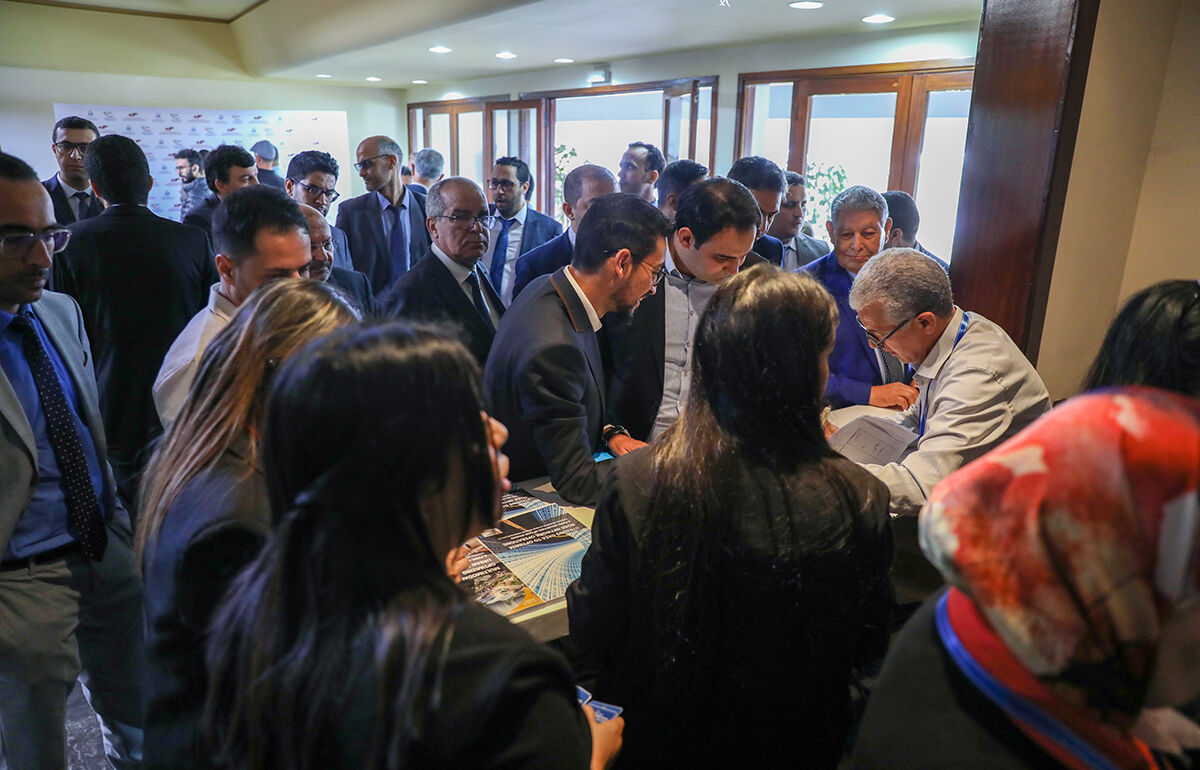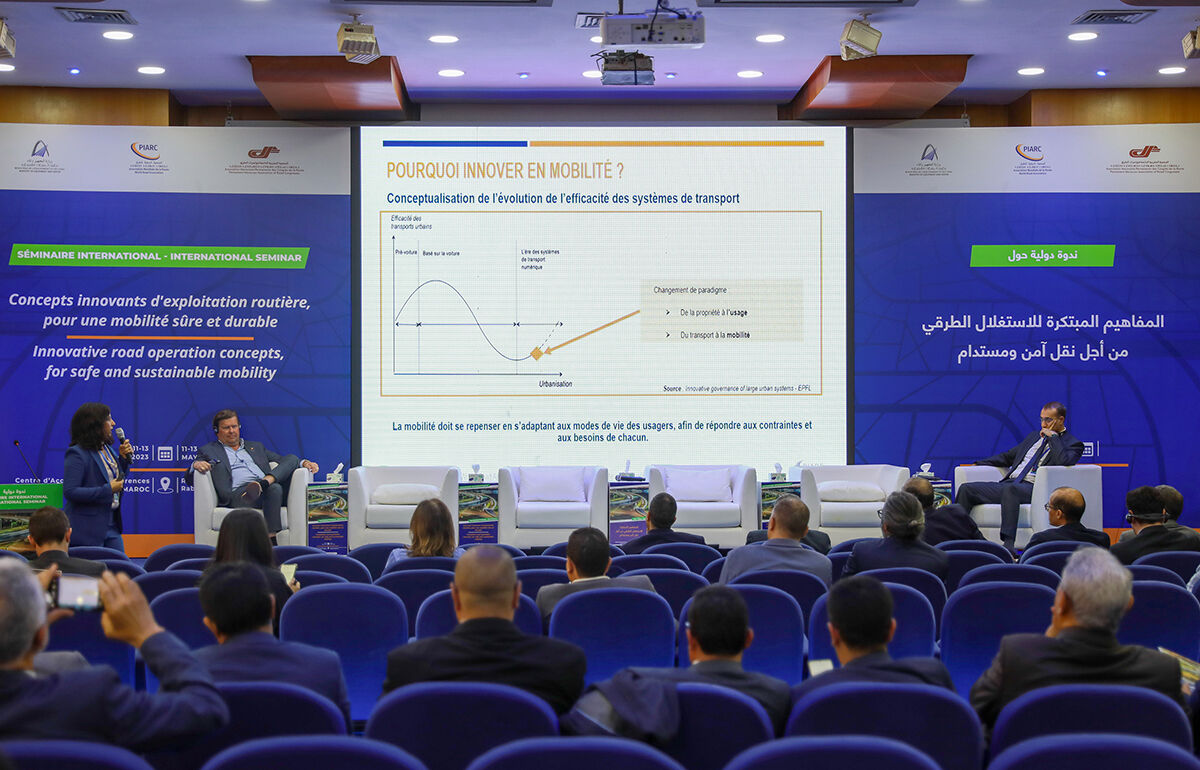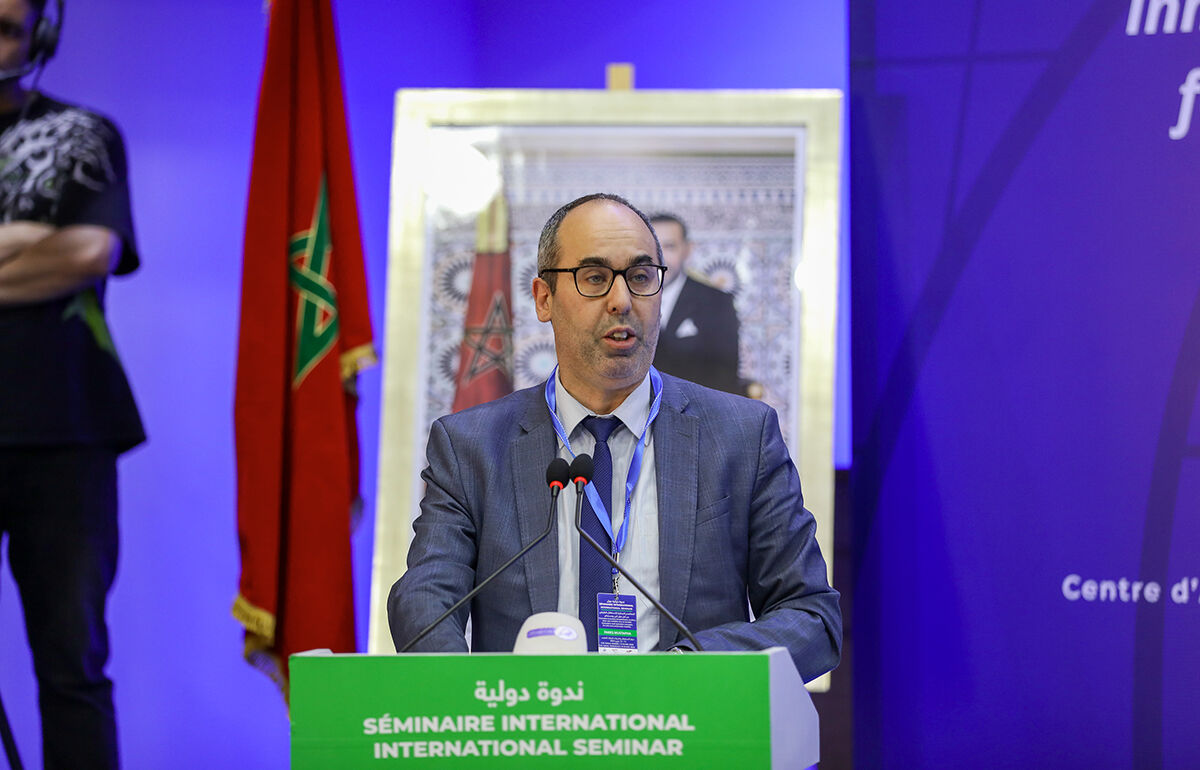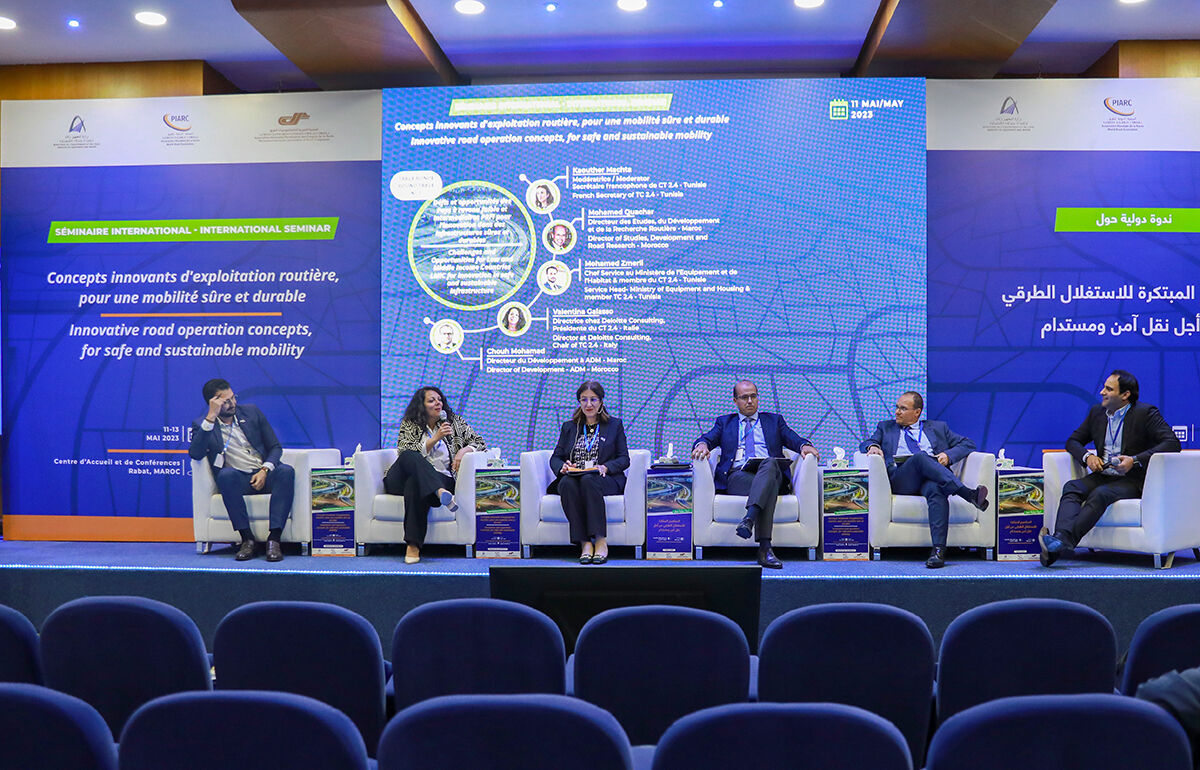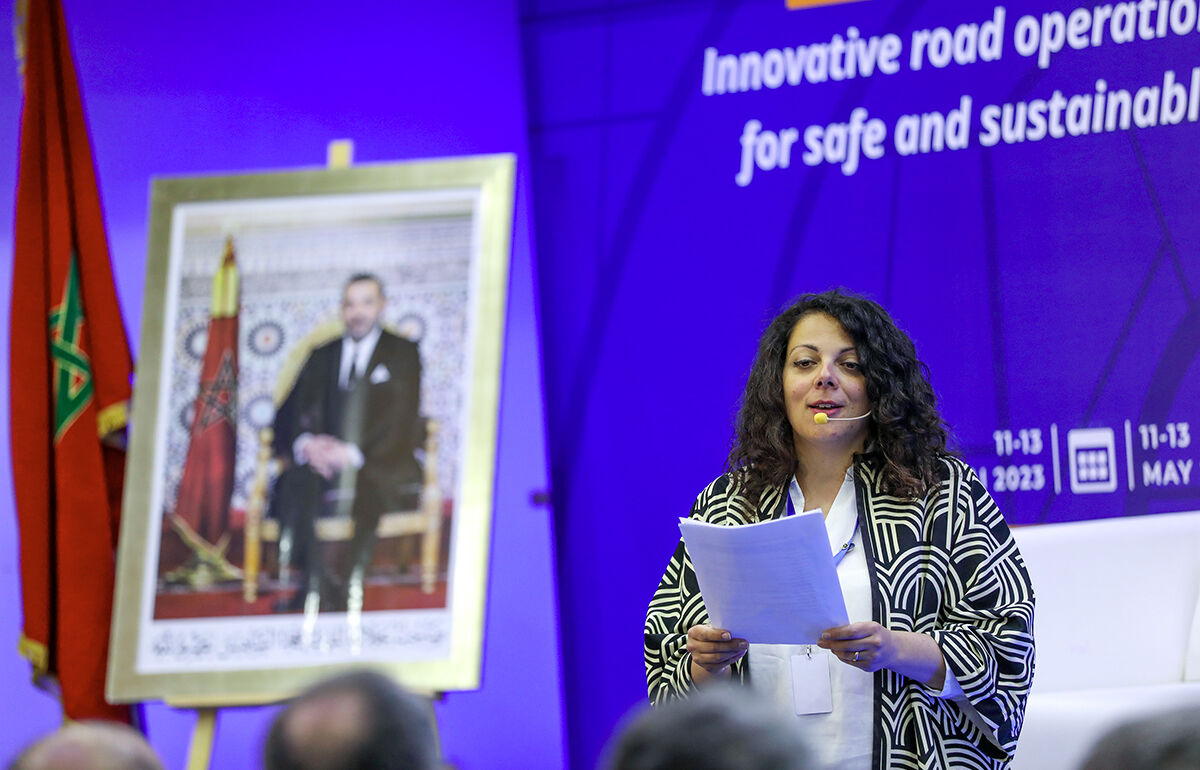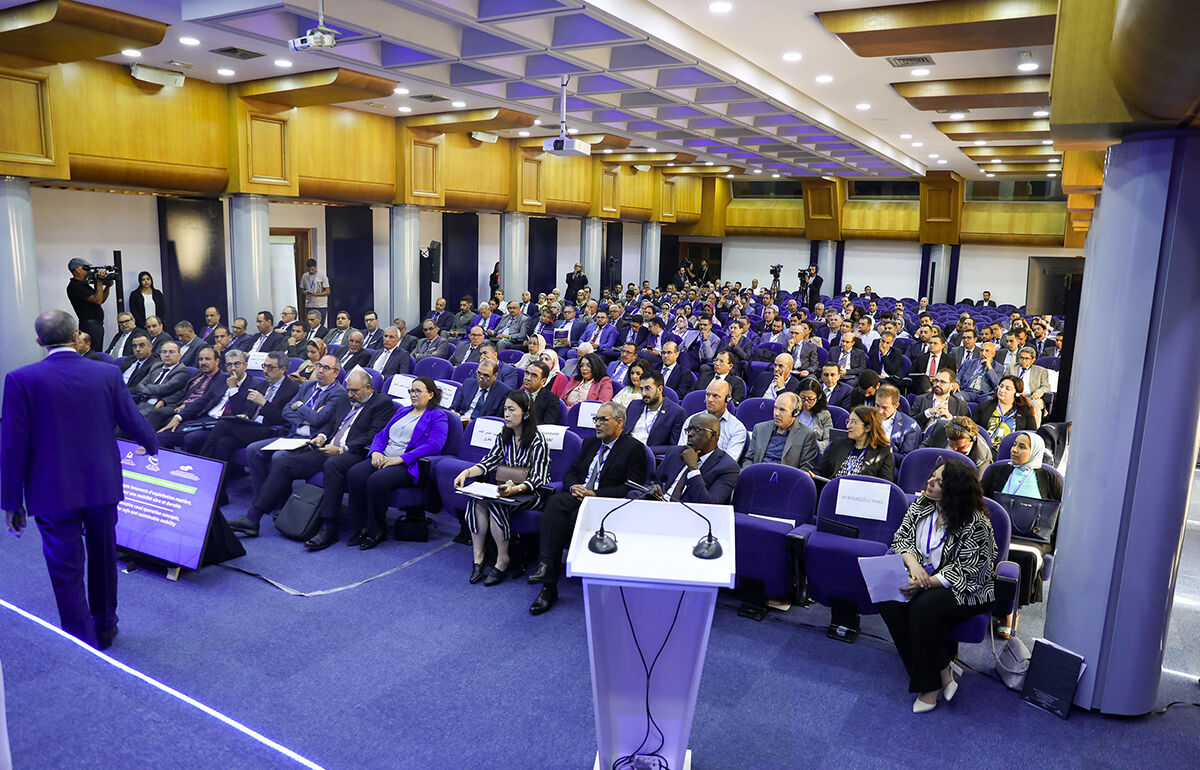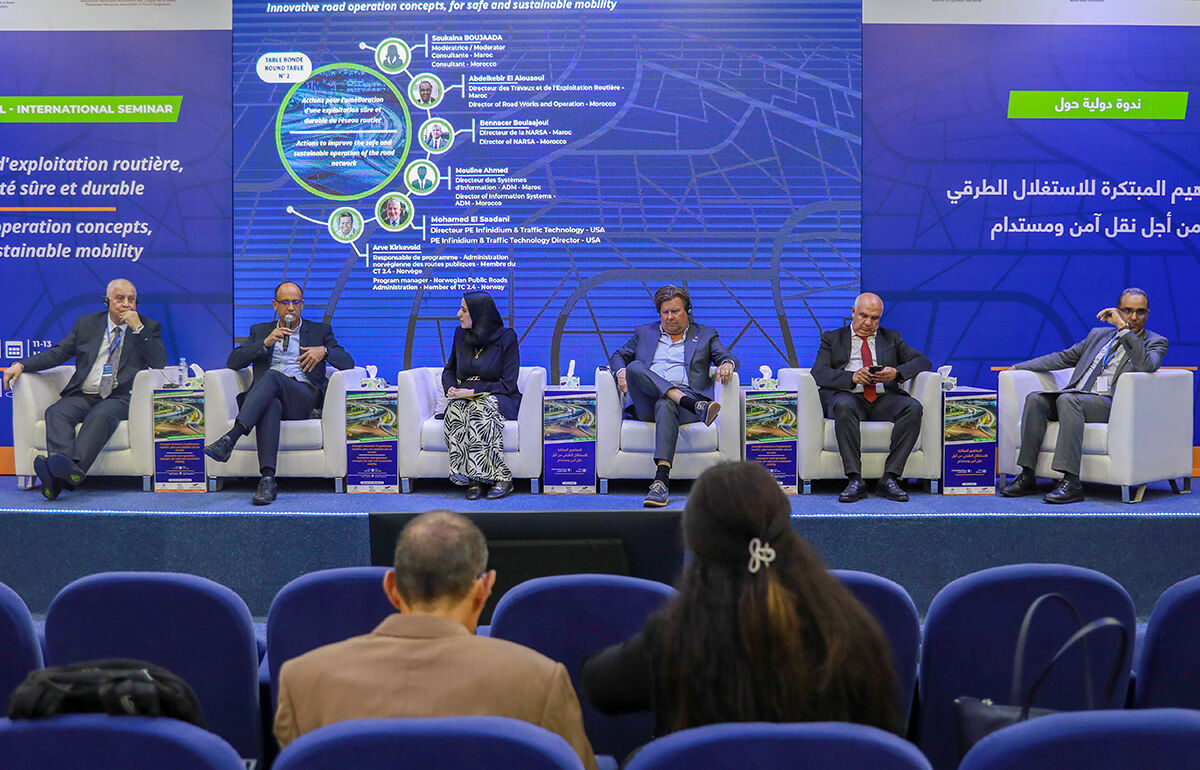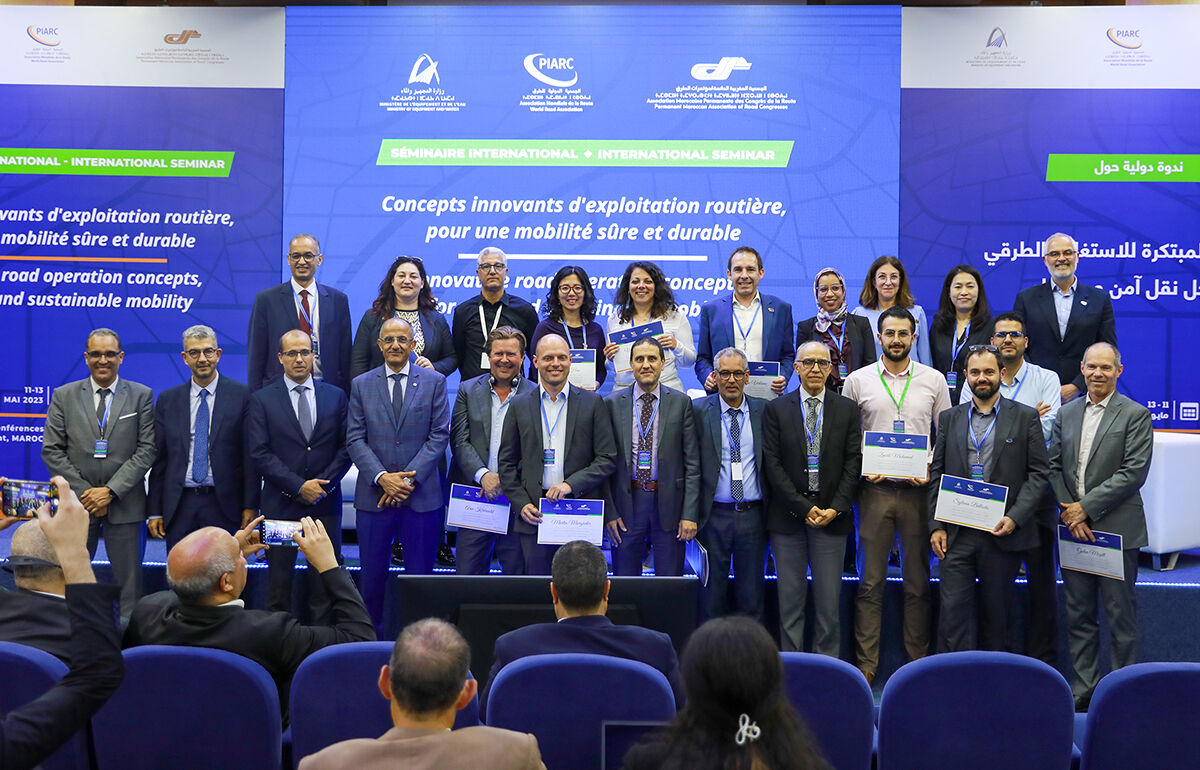International seminar "Innovative road operation concepts for safe and sustainable mobility"
11-13 May 2023, Rabat (Morocco)
The International Seminar, held at the Reception and Conference Center, was organized jointly by the Technical Comittee 2.4 "Road Network Operation / Intelligent Transportation Systems" of PIARC (World Road Association), the Permanent Moroccan Association of Road Congresses (PMARC) and the Ministry of Equipment and Water on "Innovative road operation concepts for safe and sustainable mobility".
Preparatory documents for the Workshop
Seminar Report
Context and Objectives of the Seminar
Context
Moroccos road network is the main means of transporting people and goods, with a market share of over 90% for passengers transport and 75% for goods transport. Road transport contributes 6% to gdp and employs 10% of the urban workforce.
Moroccos road assets total more than 59,100 kilometers of classified roads, valued at approximately 245 billion moroccan dirhams. However, the ministry of equipment and water continues to make sustained efforts to develop moroccos road network in response to our countrys economic and social development under the wise leadership of his majesty king mohammed vi.
Faced with a sustained increase in the mobility needs of people and goods, and within a global context marked by the decarbonization of transport, the infrastructural approach to mobility has gradually been replaced by a systemic and integrated approach to mobility.
Thanks to information and communication technologies (ict), big data and the internet of things (iot), the mobility of people and goods is no longer considered in its infrastructural dimension, but as an integrated service, hence the emergence of the concept of serviced mobility, better known as mobility-as-a-service (maas).
In order to ensure an acceptable level of service to users, it would not be feasible to systematically respond to increased demand by expanding existing infrastructure or building new infrastructure for the following reasons:
- building new road infrastructure is expensive. In a context of scarce financial resources, new construction is a last resort and must be justified on socio-economic and environmental levels.
- The construction of new road infrastructure generates several negative externalities related to: road safety, noise pollution, greenhouse gas emissions, deterioration of the quality of life especially in urban areas, etc.
Therefore, innovative road operation is an interesting alternative to the construction of new infrastructure. Innovative road operations integrate:
- actions on the existing infrastructure to improve its capacity (for example, opening certain parts of the road to temporary, permanent or exceptional traffic under certain traffic flow conditions).
- Regulation of demand by influencing the habits and behavior of road users.
Aware of these challenges, in 2014, the ministry of equipment and water launched the national mobility master plan study, which represents a pioneering national reflection on the potential for intermodality between different modes of transport. It aims is to define the relevant areas for each mode and to improve the overall efficiency and sustainability of the transport system. The priority that our country has given to sustainable mobility was recently confirmed by the new development model, which identified it as a high-potential sector at national level.
As part of the ongoing cooperation between the permanent moroccan association of road conferences and the world road association, this seminar was one of a long series of international and regional conferences and seminars on the operation, financing, and technological development of road construction and maintenance, namely:
- the 19th world road congress, held in september 1991, morocco being the first african country to host this event.
- a seminar on rural road maintenance held in rabat in april 2006.
- a seminar on financing road infrastructure in rabat in april 2009.
- a seminar on earthworks and pavements in arid and semi-arid environments in rabat, june 2014.
- a workshop on road safety management policies and programs in marrakech, april 2017.
Objectives
The objectives of this seminar were to:
- Compare the state of knowledge and national practices in road operations with international practices and knowledge.
- Explore the potential contribution of innovation in improving road operations strategies, in particular with regard to safety, resilience and sustainability issues.
- Promote the exchange of national and international road operations experience.
- Benefit from feedback from the different countries and institutions represented and review national road operations policies accordingly.
- Stimulate debate on the future of mobility in general and road mobility in particular and discuss the challenges and opportunities facing road operators.
- Forge new partnerships to address the challenges of international road operations.
Summary of Seminar Proceedings
Opening Session
Mr. Nabil BENAZZOUZ, President of MFEC and Managing Director of IDAFA, chaired this inaugural session.
The seminar was opened by Mr. Nizar BARAKA, Minister of Equipment and Water. He was represented by Mr. Mustapha FARES, Secretary General of the Ministry.
In his opening speech, Mr. Baraka highlighted Morocco’s efforts over the past twenty years, under the wise leadership of His Majesty King Mohammed VI, to strengthen its position on the international stage thanks to its achievements in roads and ports. However, in a context of crisis and structural change, the Minister’s speech underlined the importance of:
- Ensuring the needs of sovereignty in its various actions through the valorization of regional territorial qualifications. This requires the involvement of the regions in the provision of infrastructure for the achievement of national sovereignty objectives, particularly in relation to roads and mobility services.
- Promoting and strengthening national unity by ensuring social and territorial equity and providing an adequate level of infrastructure, particularly roads. The aim is to guarantee citizens’ access to educational, health and economic facilities (touristic areas and weekly markets) and to ensure that Moroccans benefit from the economic wealth of the territories.
The Minister’s speech also highlighted the main achievements of the Ministry of Equipment and Water in terms of the elimination of traffic bottlenecks, the reinforcement, resurfacing and widening of roads, the rehabilitation of engineering structures and the permanent restoration of flooded areas.
After the opening speech of the Minister, Valentina GALASSO, Chair of TC 2.4 of PIARC, presented the Strategic Development Plan 2020 - 2023 of TC 2.4.
At the end of this inaugural session, Mr. Nazir ALI, President of PIARC, recalled the vital importance of road operations, particularly in the African context, and their substantial contribution to the efficiency, sustainability, and safety of transport systems.
Session 1: Examples of road operations and innovative ITS systems in Morocco and worldwide
4 interesting examples of road operations and innovative its systems were presented during this session:
- The moroccan experience in implementing its was presented from two different perspectives:
- the urban approach, through the experience of the rabat region mobilite in the implementation of the tramway in the rabat-sale-temara agglomeration. Indeed, the tramway is an integrated system that combines both sustainability and innovation: it saves about 4,000 toe of energy per year and reduces co2 emissions by 16,000 tons per year. It makes a significant contribution to improving the quality of life and spaces in the city center by reducing traffic congestion and nuisances (noise, pollution, lack of safety, etc. ).
In addition, it will make a significant contribution to the improvement of the urban landscape by providing an opportunity for urban renewal of the neighborhoods through which it passes. In order to provide a satisfactory level of service to users, the rabat-sale tramway system is also equipped with absolute priority systems at intersections, driver assistance and passenger information systems, and state-of-the-art ticketing systems. - The intercity approach through adms experience in extending the closed tolling system and the mass deployment of the electronic toll collection system. This will help to simplify the network operating system, improve the level of service offered to users and reduce operating costs, thereby contributing to the efficiency and sustainability of the overall system.
- Floating car data (fcd) as a complementary or even alternative device to traditional traffic data collection methods (electromagnetic loops). Feedback from the french ministry of ecological transition and territorial cohesion gives this technology a number of advantages, including:
- ease of implementation.
- no equipment maintenance and upkeep.
- reasonable cost (about 100 /km/year for real-time data).
- responsive technology to changes in traffic conditions.
- possible one-off purchase for a specific need (e. G. , seasonal issues).
However, it has a number of drawbacks:
- lack of knowledge of throughput and occupancy rate.
- difficulty in determining the distribution of traffic between cars and trucks.
- lack of availability of data by lane.
- dependence on one service provider.
It is therefore recommended to combine fcd with traditional traffic data collection using electromagnetic loops.
- The experience of the tunisian ministry of equipment and housing provides us with two examples of how innovation can be applied to road operations:
- the use of artificial intelligence in the inventory of all road components, the determination of the pavement condition and the analysis of road video recordings.
- dynamic weighing of vehicles and use of weighing data in real time
Session 2: Road Network Operations and Infrastructure Resilience
Climate change poses several challenges in terms of the resilience of infrastructure, which in turn has an impact on its operation.
This second session provided an opportunity to share:
- Feedback and future perspectives from the Moroccan Directorate of Road Works and Operations in dealing with winter drivability and silting problems to ensure a satisfactory level of safety and service to users.
- NTRO’s experience in assessing infrastructure resilience: the Western Australian Road Research Innovation Program (WARRIP) vulnerability assessment project has developed two assessment approaches:
- An indicator-based risk assessment method based on the correlation of vulnerability with several key factors.
- A «stakeholder approach» to risk assessment based on local experience.
For both assessment methods, a five-point scoring system has been defined: negligible, low, medium, high, and extreme vulnerability.
- ADM’s actions to address linear, water, and mass erosion of highway infrastructure, in particular:
- A risk management system to map the risk of infrastructure vulnerability to water erosion.
- Biological engineering techniques for soil fixation developed through a partnership with the National Institute of Agronomic Research (NIAR).
Session 3: The role of data in safe and sustainable road operations
The aim of this 3rd session was to highlight the importance of reliable, responsive data for both users and operators, and its contribution to improving the sustainability and safety of the road network.
In this context, the shared experiences reflect both data collection and processing:
- NARSA’s experience in road safety monitoring through the National Road Safety Observatory as a data-driven decision support tool. The NRSO, as an active system for collecting and processing accident data in interurban areas, enables the mapping of high-risk road sections, as well as a scientific repository of behavior, thus forming the basis of the National Control Plan.
- The collection of data by drone allows the construction of multi-layered georeferenced 3D models: traffic, infrastructure, buildings, vegetation, etc. These models contribute to a better understanding of road safety. These models contribute to a better understanding of the behavior of the most vulnerable road users (cyclists and pedestrians) and their interaction with connected vehicles.
- The use of artificial intelligence for vehicle counting and classification, and dynamic vehicle weighing (WIM) systems.
- The application of machine learning to predict traffic data in Morocco. This involves learning from historical data, known as training data, to create a model that can, among other things, make predictions based on new, unknown data, known as test data. Machine learning applied to mobility has many applications, including optimisation of public transportation networks, congestion management and travel time prediction, detection of vehicle anomalies/ dangerous behavior, and infrastructure quality assessment.
Session 4: The role of road operators in the development of MaaS
Mobility As-a-Service (MaaS) means approaching mobility not just in terms of infrastructure, but as a service delivered to the user. In this context, the 4th session highlighted:
- The SILA solution developed by Geomatic for the Qatar World Cup on behalf of the Qatar Ministry of Transport and Communications. This comprehensive solution integrates various functionalities: route calculation, localisation and positioning of points of interest, trip planning, integration of multimodal fares, etc.
- The MaaS solution developed within the Solent Transport Partnership involving 4 local authorities: Hampshire, Portsmouth, Southampton and The Isle of Wight C. The MaaS solution developed is designed to be simple and attractive while ensuring equal access to transport services.
- 3 MaaS projects in Greater Montreal, namely: CONCERTO, Plateform CHRONO and SAMI. Mr. Yan St-Yves, representative of the Quebec Ministry of Transport and Sustainable Mobility, also underlined the key role that road operators will have to play in the implementation of MaaS systems, to:
- Respond to the needs of citizens.
- Make integrated mobility attractive.
- Promote an open, scalable integrated mobility ecosystem.
- Encourage adoption by private and public operators.
- Establish data governance.
- The National Mobility Master Plan for Morocco until 2030 as a pioneering nationwide strategic reflection in favor of the integration of different modes of transport, undertaken by the Ministry of Equipment and Water since 2014.
Session 5: Making roads safer and more sustainable through intelligent infrastructure
This 5th session of the seminar highlighted the role of innovation in developing a safe and sustainable transport systems. This innovation is not only technological, but also strategic, organisational and financial.
Ms. Mounia SKALLI, a Moroccan mobility specialist, clearly demonstrated the importance of innovation in the mobility field in general and road operations in particular.
In addition, Mr. Kirkevold, Program Manager at the Norwegian Public Roads Administration, underlined that the role of the road operator is not necessarily to promote motorized modes of transport (individual modes particularly). In fact, the road operator is also called upon to promote active modes and micro-mobility, as this will allow us to fully utilise the capacity reserves of these modes and thus reduce road congestion.
Finally, this session also provided an opportunity to present the 5th generation of roads, namely electric roads (Wattway technology). This technology consists of covering roads with composite modules encapsulating photovoltaic cells. This technology does not require the road to be rebuilt and allows the full potential of the road to be realized.
Session 6: The role of BIG Data in Improving Road Network Operations and User Mobility
Big data, artificial intelligence and machine learning are concepts increasingly associated with road operations.
During this session, which followed on from Session N°2 - Road Network Operations and Infrastructure Resilience, several interesting applications of Big Data to road operations were presented, namely:
- The use of big data to develop AI models for vehicle classification and route reconstruction.
- The use of artificial intelligence to process video recordings for urban and interurban road counting.
- Contributing to the development of autonomous vehicle technology and intelligent transportation systems.
Course of the Seminar
The seminar was attended by eminent national speakers representing various national institutions and organisations as well as international experts from five continents:
- Africa: Tunisia and South Africa.
- Europe: France, United Kingdom, Norway, Italy, and Germany.
- America: United States and Canada.
- Asia: South Korea.
- Oceania: Australia.
At the national level, various public and private players were represented, particularly: the Ministry of Equipment and Water, ADM, Rabat Région Mobilité, companies, engineering firms, laboratories, etc.
| International Seminar Proceedings - 11-13 May 2023 Innovative road operation concepts for safe and sustainable mobility (mostly in French) |
|---|
Day 1 - 11 May
Opening session |
An opening session chaired by The Minister of Equipment and Water and Honorary President of the Permanent Moroccan Association of Road Congresses (PMARC). During this session, a word of welcome was delivered by:
|

Mr. Nazir ALI, President of PIARC
Mr. Mustapha FARES, Minister of Equipment and Water
Mrs. Valentina GALASSO, President of PIARC Technical Committee 2.4
Session 1 : Examples of road operations and innovative ITS systems in Morocco and around the world |
|
Session 2 : Road network operations and infrastructure resilience |
|
Session 3 : The role of data in safe and sustainable road operations |
|
Round Table 1 : Challenges and opportunities for low- and middle-income countries to innovate in safe and sustainable infrastructure |
|
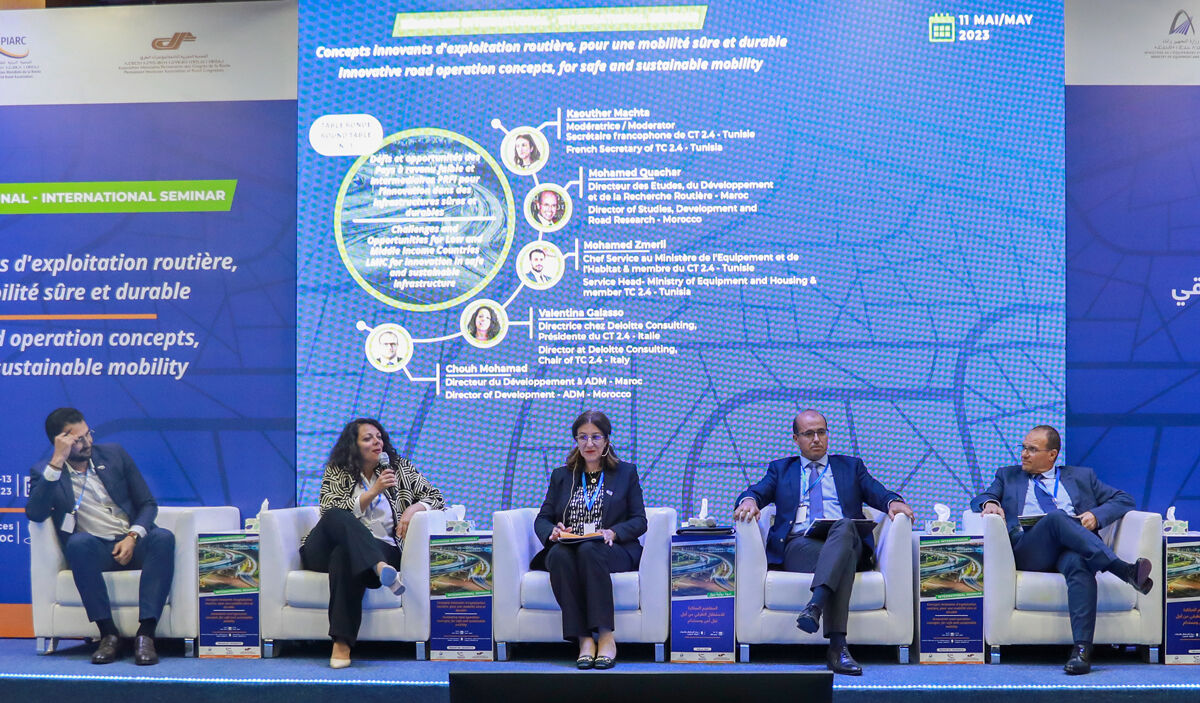
From left to right: Mr Mohamed ZMERLI, Ms Valentina GALASSO, Ms Kaouther MACHTA, Mr Mohamed QUACHAR, Mr Mohamad CHOUH
Day 2 - 12 May
Session 4 : The role of road operators in the development of MaaS |
|
Session 5: Delivering safer, more sustainable roads through intelligent infrastructure |
|
Session 6 : The role of BIG Data in improving road network operations and user mobility |
Use of Big Data in the development of AI models for vehicle classification and route reconstruction - Mr. Rachid OUAHMANE, Head of Toll Digitization and Traffic Information Management Department - ADM (Morocco) ITS experiences in the USA (in English) - Mr. Galen MC GILL, Maintenance and Operations Engineer - Oregon Department of Transportation - Member of TC 2.4 (USA) Innovation and new technologies to improve road network operations (in English) - Ms. Daniela DE NIGRIS, Head of Digital Mobility Lab at ANAS & member of TC 2.4 (Italy) The modernization of transport infrastructure based on IoT (Internet of Things). Deployment to manage variable demand and diverse field environment conditions (in English) - Mr. Mohamed EL SAADANI, Director at Infinidium & Traffic Technology (USA) |
Round Table 2 : Measures to improve the safe and sustainable operation of the road network |
|
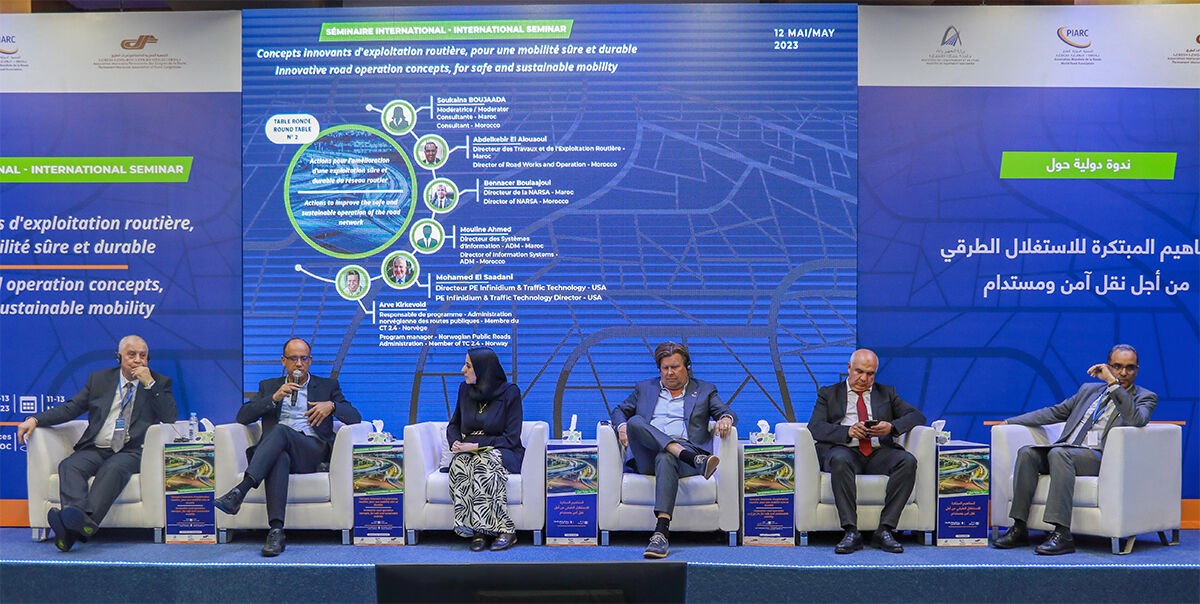
From left to right: Mr Mohamed EL SAADANI, Mr Ahmed MOULINE, Ms Soukaina BOUJAADA, Mr Arve KIRKEVOLD, Mr Hicham DIOURI, Mr Abdelkebir EL ALOUAOUI
Closing session |
|
Day 3 - 13 May
2 Technical Visits |
|

Conclusions and Recommendations
The discussions at the seminar resulted in several high-value-added recommendations that will inevitably help shape Morocco’s road operations policy. These include the following:
- Feedback from developed countries on innovative approaches is rich in lessons learned. However, it is essential to adapt the various technological solutions to the local context.
- Successful and reliable data collection is one of the keys to the successful integration of innovative systems into road operations. New technologies have emerged in this area, such as Floating Car Data and drone data collection.
- New road operations strategies focus on the user rather than the infrastructure, hence the emergence of the Mobility- as-a-Service (MAAS) concept.
- Innovative concepts offer many opportunities to improve road operations for safe and sustainable mobility. The main benefit of these concepts is that they provide users with reliable, real-time information, enabling them to make informed choices about their mode of travel and the route they choose to take.
- However, these innovative approaches pose several organisational, institutional, technological, and financial challenges, especially in low- and middle-income countries. Therefore, multi-stakeholder discussions are needed to ensure that institutional and organisational constraints do not act as a brake on innovation.
- As mobility systems are constantly changing, governments have a fundamental role to play, about long-term planning, ensuring interoperability between different subsystems, and post-evaluation of actions already taken.
- Planning must be based on carefully defined objectives and measurable indicators to evaluate the efforts already made and those yet to be implemented.
- Local development of innovative systems should not be excluded in low- and middle-income countries. Indeed, it has been shown that investing in local innovation is more profitable in the long run than choosing off-the-shelf innovative solutions. Hence the importance of fostering closer links between universities, companies, and institutional actors.
- The future of mobility should be safe and sustainable, both physically and digitally, by promoting intermodality between different modes of transport and securing data collection.
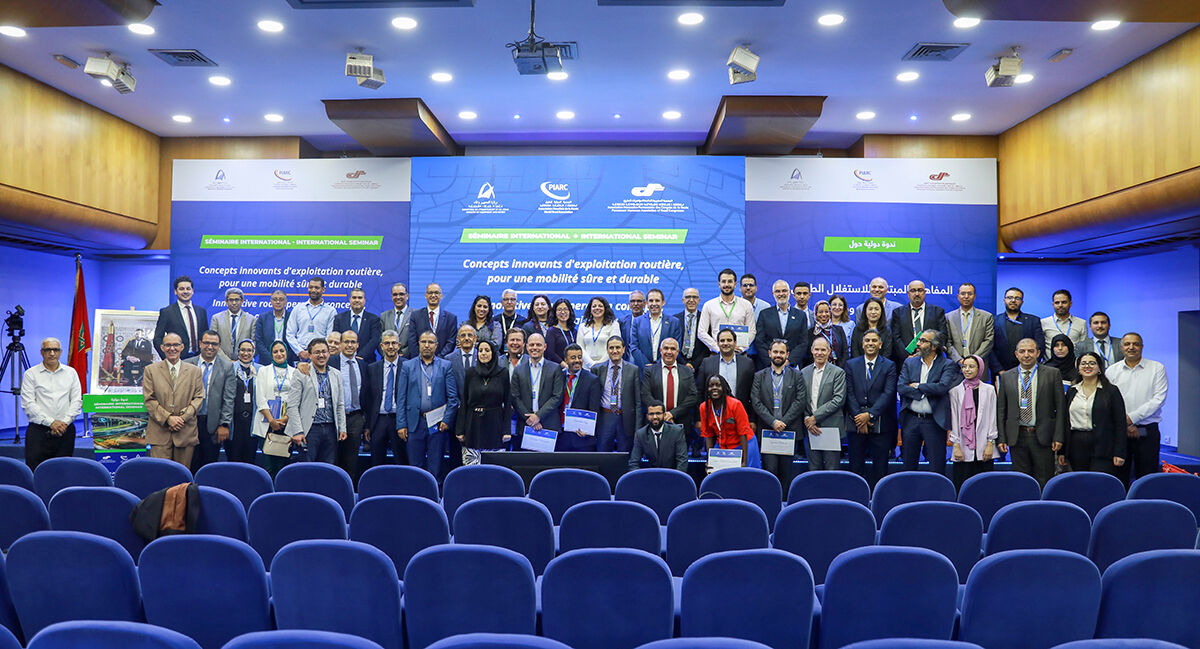
Group of International Seminar participants
